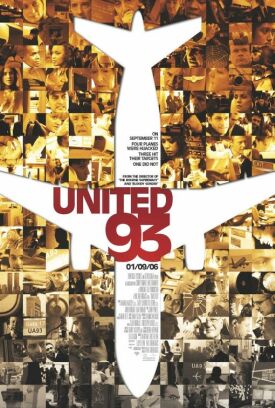United 93
I didn’t look forward to seeing Paul Greengrass’s United 93. Those who called out “Too soon!” when the trailer was first shown a few weeks ago have my sympathy. Even five years later, I’m inclined to think that we’re still too close to the dreadful events of September 11th, 2001 to put them into a movie. But this is not quite for the reason some may think. In particular, I think so not because it’s insensitive to the families of the dead or because we don’t need to be reminded of the horror we felt then. On the contrary, Mr Greengrass’s film is if anything, too sensitive, to the families, as they have apparently put a veto on any emphasis on the heroism of some of the passengers that day. And the film itself is the best evidence that we need to be reminded of the full ghastliness of these atrocities for, powerful as it is in many ways, it shows some signs of being influenced by the liberal and revisionist view of the events of 9/11, namely that the attacks were at least partly our own fault.
No, the reason that it’s too soon is that there has been insufficient time to create the space between illusion and reality that all art requires. The problem is a complex one. Movies, like other art forms, have to remind us from time to time of their artificiality in order to create the illusion of reality. That sounds paradoxical, I know, but United 93 is a good illustration of why it is. In it, the material creates an effortless sense of reality of its own — since everyone already knows more or less what happened on flight 93 that day — and so the film-maker’s art is compromised. Instead of trying to make his images look more real, he has to stop them from looking too real; instead of pressing on the accelerator, he has to slam on the brakes. As a result, his compromises with reality stand out all the more plainly, and his own point of view comes between us and his material.
Thus his cross-cutting between the scenes on the airplane that crashed into a field in Somerset County, Pennsylvania, that day and the clueless military and civilian authorities on the ground hints more than usually of a political purpose — and, sure enough, John Farmer has taken the opportunity to advance what must be the most preposterous argument of the decade in the Washington Post, namely that Hollywood’s version of reality is more to be relied on than the federal government’s. Thus, too, Mr Greengrass’s efforts to downplay the heroism of Todd Beamer (David Alan Basche), Jeremy Glick (Peter Hermann), Thomas Burnett (Christian Clemenson) and Mark Bingham (Cheyenne Jackson) in deference to the other families presented David Thomson with the opportunity to argue in the New York Times that to regard these men as heroes would be to perpetuate misunderstanding and thus lead to further acts of terror. Incredibly (to me), Mr Thomson criticizes Mr Greengrass for showing too much heroism on the part of the passengers, thus suggesting that the hijackers are “evil” or “insane.” But those who watch the film will find the hijackers treated with as much sympathy as we could possibly imagine in any film that was not simply propaganda for their point of view. Just before they board the plane, we hear the lead hijacker, Ziad Jarrah (Khalid Abdalla) whisper, Ich liebe dich into his cell-phone, a detail obviously meant to create a degree of moral equivalence between his death and that of all the desperate passengers we are shortly to hear saying their final “I love yous” to family and friends as the plane goes down.
The film is undeniably powerful, but it also hits us like a suitcase falling out of an overhead bin with its unreality. When we see the ordinariness of the preparations for departure, and of the people as they get on the plane at Newark on the fateful September morning, the emphasis on what would in other circumstances be reality only stresses the unreal. When the flight is delayed, the pointed irony of the pilot’s announcement that “Everything’s fine, it’s just a normal delay out of Newark” fairly shrieks its reminder to us of what we know that these people don’t. Don’t listen to him, folks! It’s not just a normal delay out of Newark! The trouble is that, because we know what’s about to happen, our minds rebel. If it looks real, then it must still be possible to stop it, yet we also know it’s not possible to stop it. In order for the film to work properly as a film, the movie should persuade us of that extra bit of reality that comes from not knowing how it comes out. That’s why “predictable” is the most damning word in the critical vocabulary.
In that sense, there never was a more predictable movie than United 93, since literally everybody knows how it comes out. Or everybody except the poor passengers. We, like them, feel ourselves trapped in a nightmarish situation from which there seems no exit, but they have that slender hope which is all the crueler in its deceptiveness because we know it to be vain. How can they not know? Everybody else knows. The wedge of this knowledge opens up a gap between ourselves and them that soon yawns wide and allows us to pity them without identifying ourselves with them. They are like us in every way except in not knowing that they are doomed, but being doomed and not yet knowing it — as of course we do know it — ultimately makes them completely unlike us.
This excessive distance between us and them is exacerbated by Mr Greengrass’s style and authorial outlook, which is to increase at every opportunity that pity-stream while at the same time playing down the opportunities for the one thing that would cut through the excessive pathos, namely admiration for the heroes who fought back. To me, that would have been the only thing that could have justified him in making this film. But, as articles like David Thomson’s remind us, he also had to wrestle with an in-built cultural bias in favor of the victim-hero, and unlike Messrs Beamer, Glick, Burnett and Bingham, he didn’t put up much of a fight. He hardly even identifies the heroes, or allows them to stand out from the rest. Equality in victimhood, insofar as it remains possible when we know that some did fight back, seems to have been his guiding principle. The attack on the hijackers, when it comes, is as confusing and chaotic as doubtless it would have seemed in real life. The ability of the camera to pick out and isolate from the confusion deeds which ought to be celebrated is modestly unasserted.
The only clear-cut res gesta is the moment at which Jeremy Glick strikes the first counterblow and levels one of the hijackers with a knee to the throat. We know it is he because he has identified himself on the phone as “Jeremy”; but we swiftly lose track of him in the melée which follows. There was nothing but his name to distinguish him anyway. Only Thomas Burnett is allowed to emerge as an individual, a real take-charge guy, the first to realize: “This is a suicide mission. We have to do something. Nobody’s going to help us. We have got to do it [ourselves]” But he is not named, and the rest are just the big guys he gathers together to help him. This viewer, anyway, could not tell one from another. Even Todd Beamer’s “Let’s roll,” which has been a rallying cry for millions in the last five years, is only muttered under his breath as a gesture of impatience, and it doesn’t serve as the signal for the counterattack as we know it did in real life.
If Paul Greengrass neglects to individualize heroism, he has no such reservations when it comes to pathos. What most people are sure to take away from the film are the almost unbearable scenes in which one passenger after another says good-bye and “I love you” to loved ones on passed-around cell phones. Each has something to distinguish him or her from the others. One woman urgently wants to tell her unseen interlocutor where to find a safe, and what is the combination. One flight attendant says to another in one of those unbearable ironies before the hijacking, “I like to be home with my babies.” One touch that I liked was the Scandinavian-sounding guy who said: “I think we shouldn’t provoke them; we should do what they want.” That, too, is a satisfying irony for those of us who long to see heroism distinguished from weakness, or even villainy, but the rest of the film gives too much aid and comfort to the Scandinavian’s spiritual and political heirs who would deny the heroes of flight 93 their posthumous due.
Discover more from James Bowman
Subscribe to get the latest posts to your email.






